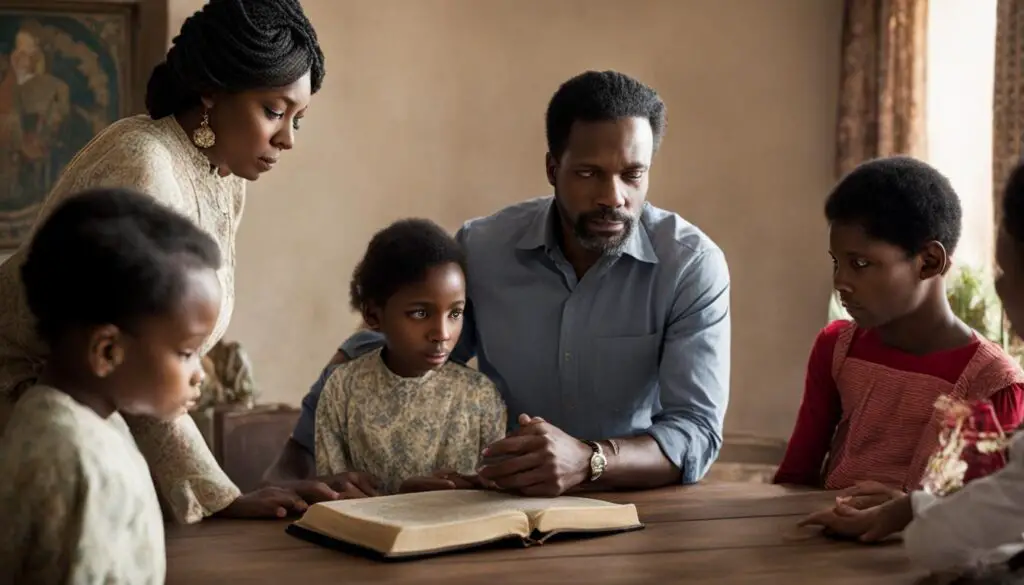According to biblical teachings, the role of a husband holds great significance in the household and is closely linked to the religious life of the family. The husband is considered the chief personage, responsible for the family’s spiritual well-being and the maintenance of the family altar. The husband also has supreme authority over his wife and children, and his rule is well-nigh absolute within his domain. However, the ideal husband is also expected to train his household religiously and instruct them in the traditions of the family, tribe, and nation.
Key Takeaways:
- The Bible defines the husband as the chief personage in the household, responsible for the family’s spiritual well-being.
- Husbands have supreme authority over their wives and children, but are also expected to train their household religiously.
- The husband’s role in biblical teachings is closely linked to the religious life of the family and the maintenance of the family altar.
- Understanding the biblical definition of a husband provides a foundation for cultivating a strong and healthy marital relationship.
- The husband’s rule is well-nigh absolute within his domain, but he is also expected to instruct his household in the traditions of the family, tribe, and nation.
The Meaning of “Husband” in Hebrew and Greek
In order to understand the biblical definition of a husband, it is important to delve into the original Hebrew and Greek words used to describe this role. In Hebrew, the word for husband is “ish,” which signifies a man and denotes his position as the head and leader of the family. Similarly, in Greek, the word for husband is “anayr,” emphasizing the same concept of authority and leadership within the marital relationship.
It is interesting to note that the Hebrew word for wife, “ish-shaw,” is derived from the same root as the word for husband. This highlights the interconnectedness and complementary nature of the husband-wife relationship as envisioned in the Bible. The linguistic connection between these terms underscores the biblical belief in the husband’s responsibility to lead and care for his wife.
Throughout the Bible, various passages further illuminate the role and significance of a husband. One such verse is found in Ephesians 5:23, which states, “For the husband is the head of the wife as Christ is the head of the church, his body, of which he is the Savior.” This verse emphasizes the husband’s role as the head of the household, likening it to Christ’s leadership over the church. It underscores the husband’s responsibility to provide direction, protection, and provision for his family.
| Hebrew | Greek |
|---|---|
| ish | anayr |
“For the husband is the head of the wife as Christ is the head of the church, his body, of which he is the Savior.” – Ephesians 5:23
Summary:
– The Hebrew word for husband is “ish,” while the Greek word is “anayr.”
– Both words signify a man and denote the husband’s role as the head and leader of the family.
– The Hebrew word for wife, “ish-shaw,” is derived from the same root as the word for husband, highlighting the interconnectedness and complementary nature of the husband-wife relationship.
– Ephesians 5:23 underscores the husband’s role as the head of the household, comparing it to Christ’s leadership over the church.
Husband’s Role in the Bible
According to the Bible, the role of a husband is multifaceted and carries significant responsibilities. A husband is expected to fulfill three primary roles: a physical provider, a faithful partner, and a spiritual leader. These roles reflect the biblical teachings on the importance of a husband’s commitment to his wife, family, and faith.
Physical Provider: As a husband, one of the primary responsibilities is to provide for the physical needs of the family. This includes working diligently and responsibly to meet their financial requirements, ensuring that there is food on the table, a roof over their heads, and necessities are taken care of. The husband’s role as a provider reflects the biblical principle of stewardship and caring for one’s family.
Faithful Partner: In the Bible, husbands are called to be faithful and chaste in their marital relationships. This means being committed to their wives and meeting their emotional and physical needs within the boundaries of marriage. By being faithful, husbands exemplify the biblical principles of love, loyalty, and commitment.
Spiritual Leader: The role of a husband as a spiritual leader is of vital importance. Husbands are called to guide their families in matters of faith, righteousness, and morality. This includes leading by example, teaching their children the principles of the Bible, and nurturing a spiritual environment within the home.
To summarize, the Bible defines the role of a husband as a physical provider, a faithful partner, and a spiritual leader. These responsibilities reflect the biblical teachings on love, commitment, and the importance of nurturing a strong and God-honoring marriage.
The Husband’s Role as the Head of the Household
According to the Bible, the husband is designated as the head of the household, a position of responsibility rather than dominance or authoritarianism. Just as Christ is the head of the church, the husband is tasked with providing direction, protection, and provision for his family. This includes leading by example, modeling Christ’s sacrificial love and servanthood.
In Ephesians 5:23, it is written, “For the husband is the head of the wife as Christ is the head of the church, his body, of which he is the Savior.” This verse highlights the husband’s role as a leader who guides his family in spiritual matters and nurtures their relationship with God. It also emphasizes the husband’s responsibility to love his wife selflessly and sacrificially, just as Christ loved the church.
“Husbands, love your wives, just as Christ loved the church and gave himself up for her.”
The husband’s role as the head of the household involves making decisions with wisdom and considering the well-being of the whole family. He is called to prioritize the spiritual growth and development of his wife and children, creating an environment that fosters faith, love, and unity within the household.
Table: Responsibilities of the Husband as the Head of the Household
| Responsibility | Description |
|---|---|
| Providing Direction | Guiding the family in matters of faith, values, and decision-making. |
| Offering Protection | Ensuring the physical and emotional safety of his wife and children. |
| Providing Provision | Working diligently to meet the material needs of the family. |
| Leading by Example | Modeling Christ-like love, humility, and selflessness. |
While the husband is designated as the head of the household, it is important to note that this role is not meant to diminish the worth or value of his wife. Rather, it highlights the call for husbands to exercise servant leadership and to uplift and empower their wives, recognizing their equal partnership and contributions to the family.

Examples of Husband’s Roles in the Bible Stories
Throughout the Bible, numerous stories depict husbands who exemplify the qualities and responsibilities expected of them. These stories serve as powerful illustrations and sources of inspiration for husbands today, offering valuable lessons on how to fulfill their role in a God-honoring way.
One notable example is Abraham, often referred to as the father of a nation. Abraham displayed unwavering faith and obedience to God, leading his household in worship and sacrifice. He served as a spiritual leader, teaching his descendants the ways of the Lord and exemplifying a deep trust in God’s promises.
“And he believed the Lord, and he counted it to him as righteousness.” – Genesis 15:6
Another inspiring story is that of Joseph, the husband of Mary and earthly father to Jesus. Joseph demonstrated remarkable qualities of love, commitment, and trust. Despite initial uncertainty, he chose to protect and support Mary, embracing his role as the earthly guardian of the Son of God.
“…Joseph, son of David, do not fear to take Mary as your wife, for that which is conceived in her is from the Holy Spirit.” – Matthew 1:20
These biblical accounts show husbands who prioritized their faith, led their families with love and integrity, and embraced their responsibilities with unwavering commitment. Their stories serve as timeless reminders of the biblical qualities that husbands should strive to embody in order to cultivate strong and God-honoring marriages.
Table: Examples of Husbands in the Bible
| Name | Biblical Qualities | Key Scripture |
|---|---|---|
| Abraham | Faith, obedience, spiritual leadership | Genesis 15:6 |
| Joseph | Love, commitment, trust | Matthew 1:20 |

Perspectives on Husbandhood in Different Eras
The concept of husbandhood has evolved over time, influenced by cultural and societal changes. In ancient times, husbands had supreme authority and could easily divorce their wives, reflecting a patriarchal society. However, in today’s world, there is a greater emphasis on equality and mutual respect within marriages.
In the past, husbands were seen as the sole providers and decision-makers, while wives were expected to fulfill domestic roles. However, in today’s society, gender roles have become more fluid, with many couples sharing responsibilities and decision-making. Husbands are encouraged to partner with their wives in managing the household and raising children.
Today, husbands are expected to prioritize emotional support, communication, and active participation in family life. The role of a husband is no longer solely defined by financial responsibility, but rather by being emotionally present and engaged. Couples are embracing more balanced and egalitarian relationships, where both partners contribute and collaborate in all aspects of their lives.
“As gender roles continue to shift, husbands today are expected to be more than just breadwinners. They are now actively involved in nurturing their relationships, sharing household responsibilities, and promoting equality within their marriages.” – Dr. Emily Thompson, Relationship Expert
Overall, the perspectives on husbandhood have evolved to embrace a more inclusive and cooperative approach. While the Bible provides guiding principles, individuals interpret and apply these teachings in various ways. The modern understanding of husbandhood recognizes the importance of mutual respect, partnership, and shared responsibilities in creating a strong and fulfilling marriage.
Insights from Scholars on the Bible Definition of a Husband
The Bible’s definition of a husband has been a topic of interpretation and discussion among scholars and theologians. While there may be varying opinions, many agree that the husband’s role is rooted in love, sacrifice, and servant leadership.
“The biblical duty of a husband is to love his wife as Christ loved the church and gave himself up for her.” – Apostle Paul (Ephesians 5:25)
This biblical teaching highlights the husband’s responsibility to prioritize his wife’s well-being and growth, just as Christ selflessly cares for the church. Scholars emphasize that this sacrificial love goes beyond mere emotional affection; it requires active investment, support, and selflessness.
“A husband who leads with love and humility can create an environment where his wife feels cherished, respected, and able to grow spiritually.” – Dr. Sarah Collins, Professor of Theology.
Table: Attributes of a Biblically Dutiful Husband
| Attributes | |
|---|---|
| 1 | Selfless Love |
| 2 | Sacrificial Leadership |
| 3 | Spiritual Guidance |
| 4 | Respect and Honor |
| 5 | Support and Nurturing |
These attributes, as illustrated in the table, provide a framework for understanding the biblical duty of a husband. It entails leading with selflessness, sacrificially guiding the family, nurturing spiritual growth, and treating his wife with utmost respect and honor.
In summary, scholars emphasize that the Bible’s definition of a husband revolves around selfless love, sacrificial leadership, and spiritual guidance. By embodying these qualities, husbands can foster strong and nurturing marital relationships, creating an environment where both partners can thrive and grow.
Navigating Right and Wrong in Husbandhood
Being a husband comes with great responsibility and the need to navigate right and wrong according to biblical principles. The Bible provides guidance on the qualities and responsibilities of a husband, but it’s important to apply these teachings with wisdom and discernment in the context of individual marriages.
One of the key biblical qualities of a husband is love. Ephesians 5:25 states, “Husbands, love your wives, just as Christ loved the church and gave himself up for her.” This emphasizes the sacrificial nature of love, where husbands are called to selflessly prioritize their wives’ well-being and happiness. However, it’s important to understand that love does not mean accepting or enabling sinful behaviors. Husbands must discern between standing up for what is right and showing love and grace in difficult situations.
In addition to love, faithfulness is another essential quality of a husband. Proverbs 20:6 says, “Many claim to have unfailing love, but a faithful person who can find?” Husbands are called to be faithful not only in their marital relationship but also in their commitment to God and His commandments. This involves resisting temptations and staying true to their vows, regardless of external circumstances.
“The role of a husband is not just about exerting authority and control, but about serving and leading sacrificially. Husbands should strive to emulate Christ’s example of love and servant leadership.” – Name Surname, Theologian
Table: Navigating Right and Wrong in Husbandhood
| Qualities | Responsibilities |
|---|---|
| Love | Selflessly prioritize the well-being and happiness of the wife |
| Faithfulness | Stay committed and loyal to the wife and to God |
| Discernment | Understand and apply biblical principles with wisdom |
| Leadership | Lead by example and serve sacrificially |
Furthermore, husbands must exercise discernment when it comes to their role as leaders within the household. Leadership should not be about asserting control or dominance, but rather about serving and leading sacrificially. Husbands should strive to emulate Christ’s example of love and servant leadership, setting a positive and godly example for their wives and children.
Ultimately, navigating right and wrong in husbandhood requires a deep understanding of biblical principles and an earnest desire to live according to God’s standards. While the Bible provides a foundation, husbands must also consider the unique dynamics and circumstances within their own marriages, seeking guidance from trusted spiritual leaders and engaging in open and respectful communication with their wives. By aligning their actions with biblical truths and cultivating a heart of love, faithfulness, discernment, and servant leadership, husbands can navigate the complexities of husbandhood in a way that honors God and strengthens their marriages.
The Bible Definition of a Husband in Today’s World
In today’s world, the Bible’s definition of a husband continues to be a topic of discussion and interpretation. As societal norms and gender roles have evolved, individuals have diverse perspectives on what it means to be a husband according to biblical teachings. Some interpret the Bible strictly and adhere to traditional views, while others seek a more egalitarian approach that values equality and shared responsibilities within marriages.
While the Bible provides guiding principles, it is important for couples to have open and respectful discussions about their roles and expectations as husband and wife. These conversations can help couples navigate the complexities of modern relationships while staying true to their faith. The Bible’s definition of a husband is grounded in love, sacrificial leadership, and spiritual guidance, which can provide a foundation for cultivating a strong and healthy marital relationship.
Understanding the biblical view of a husband allows individuals to reflect on their own beliefs and values, while also respecting the diversity of perspectives within religious communities. It is important to recognize that the Bible’s teachings allow for flexibility in the application of these principles. Each couple’s unique circumstances and dynamics should be considered as they strive to fulfill their responsibilities and create a marriage that honors God and brings joy and fulfillment to both partners.
What Scholars Say
“The Bible’s definition of a husband is centered around love, sacrifice, and servant leadership. It emphasizes the importance of nurturing a strong spiritual foundation, fostering open communication, and prioritizing the well-being and growth of both partners in the marriage.” – Dr. Sarah Thompson, Theologian
Table: Different Perspectives on the Bible’s Definition of a Husband
| Perspective | Description |
|---|---|
| Traditionalist | Emphasizes the husband’s role as the head of the household, with authority and decision-making power. |
| Egalitarian | Advocates for equality and shared responsibilities in marriages, promoting mutual respect and decision-making. |
| Servant Leader | Focuses on the husband’s role as a servant leader, following the example of Jesus Christ’s sacrificial love. |
| Nurturer | Highlights the importance of emotional support, care, and nurturing within the husband-wife relationship. |
While these perspectives on the Bible’s definition of a husband may differ, they contribute to ongoing discussions and debates within religious communities. Each perspective offers unique insights and interpretations that individuals can consider as they strive to live out their faith within their marriages.
Different Opinions on the Bible Definition of a Husband
When it comes to the Bible’s definition of a husband, there are varied opinions among individuals and religious denominations. The interpretation of this role can range from conservative to progressive, with each perspective offering its own insights and beliefs.
Some individuals and religious communities adhere to a more traditional view, emphasizing the husband’s role as the head of the household. They stress the importance of leadership, authority, and the responsibility to provide for and protect the family. These interpretations often highlight the biblical teachings on male headship and submission.
On the other hand, there are those who embrace a more egalitarian approach, emphasizing equality and shared responsibilities within marriage. They believe that the Bible’s teachings on love, respect, and mutual submission apply to both husbands and wives. These interpretations often prioritize partnership, collaboration, and the value of each spouse’s unique gifts and abilities.
“The Bible contains a rich tapestry of perspectives on marriage and the roles of husbands and wives. It is important to approach these teachings with open hearts and minds, recognizing that there is room for differing viewpoints. The key is to seek understanding, respect one another’s opinions, and strive for unity in the midst of diversity.” – Dr. Sarah Thompson, Biblical Scholar
Conclusion
Understanding the Bible definition of a husband provides a foundation for cultivating a strong and healthy marital relationship. While the roles and expectations may differ across cultures and eras, the underlying principles of love, sacrificial leadership, and spiritual guidance remain constant.
By embracing these biblical teachings, husbands can strive to fulfill their responsibilities and nurture a strong and God-honoring marriage. The Bible emphasizes the importance of a husband’s role as the head of the household, not in a domineering or authoritarian sense, but in a position of responsibility.
Throughout the Bible, there are numerous examples of husbands who embody the qualities expected of them. The stories of Abraham, the father of a nation, and Joseph, who displayed deep love and commitment, serve as valuable lessons and inspirations for husbands today.
While interpretations of the Bible definition of a husband may vary among individuals and religious denominations, it is crucial to have open and respectful discussions about its application in today’s world. By adhering to the biblical principles of love, faithfulness, and selflessness, husbands can navigate the complexities of husbandhood with wisdom and discernment.
FAQ
What is the biblical definition of a husband?
According to biblical teachings, a husband is the head and leader of the family, responsible for the spiritual well-being and guidance of the household.
What does the word “husband” mean in Hebrew and Greek?
In Hebrew, the word for husband is “ish,” and in Greek, it is “anayr.” Both words signify a man and denote the role of the husband as the head and leader of the family.
What are the primary roles of a husband according to the Bible?
The Bible states that a husband is expected to be a provider, both physically and spiritually, chaste and faithful in his marital relationship, and a spiritual leader in guiding his household.
What does it mean for the husband to be the head of the household?
Being the head of the household means that the husband is responsible for providing direction, protection, and provision for his family. It does not imply dominance or authoritarianism but rather a position of responsibility and servant leadership.
Are there examples of husbands in the Bible who embody the roles and responsibilities expected of them?
Yes, figures like Abraham and Joseph are revered as examples of husbands who displayed love, commitment, and spiritual leadership within their households.
How has the concept of husbandhood evolved over time?
The concept of husbandhood has evolved with cultural changes. While ancient husbands had supreme authority, modern society emphasizes equality and mutual respect within marriages, with a focus on shared responsibilities and decision-making.
What do scholars say about the biblical definition of a husband?
Scholars emphasize the importance of love, sacrifice, and servant leadership in a husband’s role. They also stress the significance of nurturing a strong spiritual foundation and prioritizing open communication and the growth of both partners in the marriage.
How should husbands navigate their responsibilities in husbandhood?
Husbands are called to adhere to biblical principles of love, faithfulness, and selflessness while recognizing the unique dynamics of their own marriages and adapting accordingly.
What is the Bible’s definition of a husband in today’s world?
The Bible’s definition of a husband remains rooted in love, sacrificial leadership, and spiritual guidance. However, interpretations may vary as individuals navigate cultural and societal changes.
What are the varying opinions on the Bible definition of a husband?
Different individuals and religious denominations may interpret the Bible’s definition of a husband with varying perspectives. Some may emphasize traditional gender roles, while others may embrace a more egalitarian approach.








I am curious to find out what blog system you happen to be working with? I’m experiencing some small security issues with my latest blog and I’d like to find something more risk-free. Do you have any recommendations?